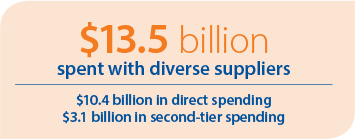Sourcing goods close to where they’re sold can be beneficial for local economies and the planet. This is why Walmart is committed to increasing local manufacturing in our retail markets. Specifically, in the U.S., Walmart has committed to giving manufacturers confidence to invest capital in America — and is playing a key role in helping revitalize the communities we serve through the support of new industries and job opportunities, while significantly reducing shipping miles, greenhouse gas emissions and more. Inspiring a manufacturing comeback requires a national effort by companies, industry leaders, lawmakers and others. We’re acting on our convictions by:
Aspiration
In 2013, Walmart announced it would purchase an additional $250 billion in products supporting American jobs by 2023.
January 2015 marked the second anniversary of Walmart’s journey to source $250 billion in products supporting U.S. jobs over 10 years. We’re on target to reach our commitment by 2023. From light bulbs to towels, patio furniture to toys, suppliers are expanding manufacturing or assembly in the U.S.
Snapshot of progress
We’re working toward our goal in three ways — increasing the purchase of goods already sourced, made or assembled here; sourcing new U.S.-made or assembled goods where it is economically feasible; and moving production to the U.S.
- NUK reshored its production of pacifiers from Europe to Reedsburg, Wis., in fall 2014.
- Chef Jenn, a U.S.-based manufacturer of seafood entrees, connected with Walmart through an Open Call last year, and her products are now sold in 800 of our stores.
- PEDS, a Canadian-based legwear manufacturer, recently opened a facility in Hildebran, N.C., where it produces socks for more than 2,000 Walmart U.S. stores.
Kent International: Bringing bicycle assembly back to the U.S.
For 56 years, Kent International Inc. has designed and produced bicycles. And for the majority of those years, the manufacturing has taken place in China and Taiwan. But in 2008, CEO Arnold Kamler found his family-owned company at a point that called for shifting gears.
“It was a perfect storm. You had steel, aluminum, oil, plastics, ocean freight, currency — everything at one time going up,” Arnold said. “I spent about six weeks traveling all over Asia, asking myself, ‘If not China, then where?’ The answer seemed to be nowhere for bicycles. The idea in the back of my mind was that maybe one day we could do it here in the U.S. Then, last year, we got serious.”
In March 2013, Arnold met South Carolina Gov. Nikki Haley at Walmart’s Year Beginning Meeting, an annual gathering of Walmart managers and suppliers. The two began discussing the possibility of Kent’s opening a factory in South Carolina. According to Kent, the company has since invested $4.3 million in a new assembly facility in the small town of Manning. By the end of this year, Arnold says, the factory will have produced 50,000 bikes for distribution to Walmart stores across America. By the end of 2016, Kent will have produced 500,000 bicycles. And another great number? Arnold estimates that the factory will bring 175 jobs to the area over the next three years. They are also in discussions to grow their U.S. production even further.

2014 U.S. Manufacturing Summit
We gathered government leaders, suppliers and Walmart executives in Denver on Aug. 14, 2014. In addition to hearing from Walmart executives, government leaders and industry experts, they had a forum for meetings between suppliers and various state representatives and economic development organizations. There was also an opportunity for meetings between suppliers and raw material and component providers, as well as investors and financial institutions.
Challenges: U.S. manufacturing
According to our suppliers, about two-thirds of what Walmart spends to buy products in our U.S. stores is made, assembled, sourced or grown domestically. We know there’s room to do more, and we’re playing an active role in helping rebuild manufacturing in the U.S.











